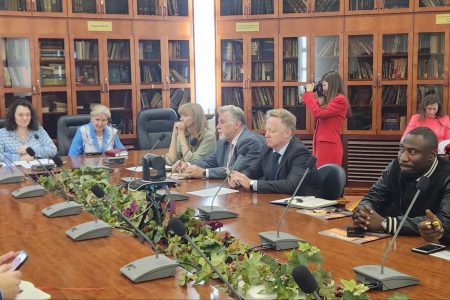Moscow, August 10, 2024 (FBC) – The Russian Federal Agency for the Commonwealth of Independent States Affairs, Compatriots Living Abroad, and International Humanitarian Cooperation (Rossotrudnichestvo) organized a meeting entitled ‘Food security Roundtable’ at the Library Hall of the Russian Chamber of Commerce and Industry in Moscow in participation of journalists from various African countries.
The roundtable meeting which brought African journalists drawn from Zambia, Republic of Congo, Tanzania and Ethiopia together focused on the progress the Russian Federation is making in agricultural advancements towards ensuring food security in Africa and the world at large.
In her opening remarks, the Head of the International Development Assistance Department at Rossotrudnichestvo, Anastasia Sycheva, stated that Russia puts great emphasis on its contribution to help nations ensure their food security through increased supply of agricultural exports and technologies.
“Africa has the youngest population in the world, and is enriched with huge agricultural potentials despite food security challenges. Russia is committed to help the continent to tackle these challenges and ensure food security.”
Andrey Dalnov, Chief Industry Expert of the Russian Agricultural Bank, stated “exacerbated by the current climate change effects, food security remains to be a global challenge making food markets chaotic.
In his presentation entitled “Exogenous Variables – National Food Strategy and Chaotic Systems”, Mr. Dalnov emphasized that Russia’s ambition to become a global leader in food supply stems from the need to address food security globally.
He explained that the agricultural strategy in Russia focuses on increasing export volumes by removing trade barriers and fostering the growth of export-oriented industries.
“Due to rising demand and insufficient supply, agricultural product prices will keep climbing. Russia possesses the necessary technology and is committed to leveraging it to boost production and lower prices,” he stated.
Regarding strategies to reduce the cost of agricultural products, Dalnov highlighted several key factors, including market control over fertilizers, the localization of artificial intelligence in pesticide production, advancements in the seed industry and creation of a market system for promoting agribusiness products.
Executive Director of the Russian Association of Fertilizer Producers, Maxim Kuznetsov, pointed out that the Russian mineral fertilizers are contributing to ensuring food security in the countries of the Global South, pledging commitment for increased supply to the African continent.
Russian fertilizer industries have exported 40 million tons of varieties of fertilizers to more than 100 world countries showing 50pct increase over the past 10 years, he said.
